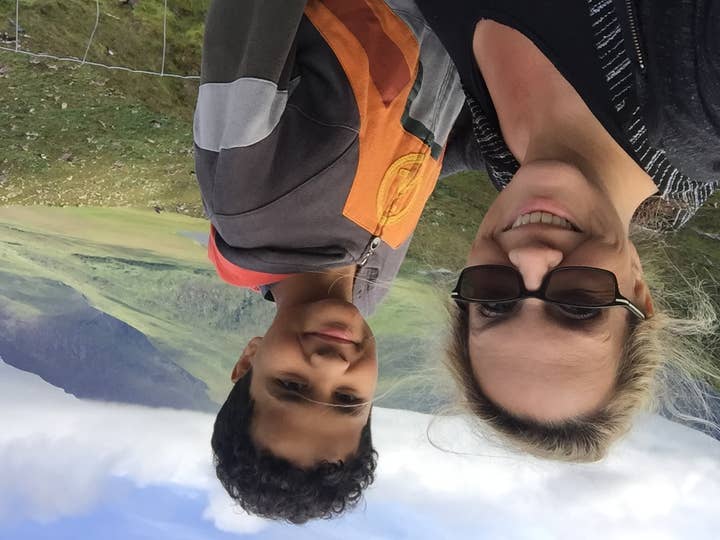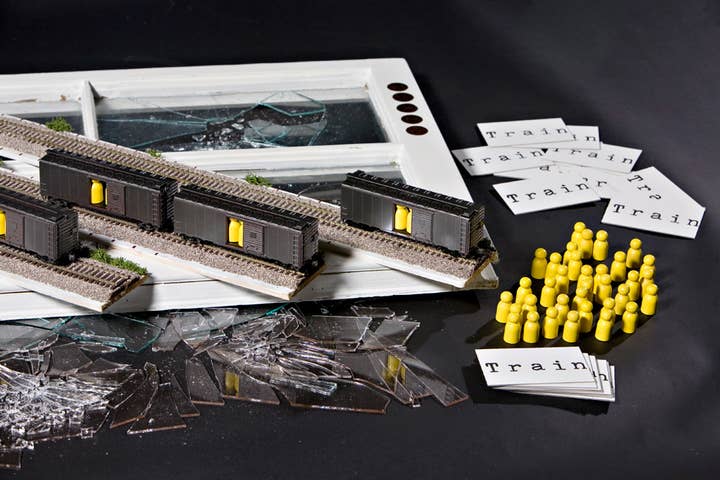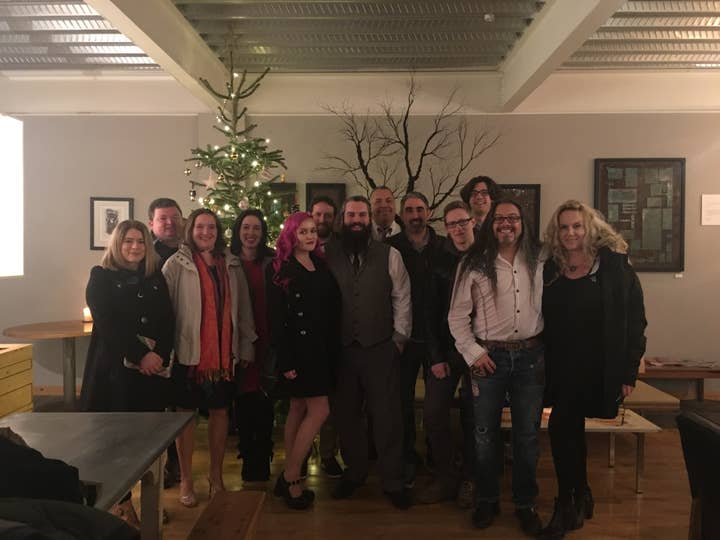BAFTA-winning Brenda Romero: “We need to expand the range of voices making games”
Long-running games designer advocates teaching kids to code, broadening the scope of development and learning from board games
BAFTA has announced this morning that it will honour Brenda Romero with its Special Award during next week's ceremony. The accolade recognises not only her work in video games, but also her advocacy of the creative process and the work she has done in encouraging a new generation of game makers.
GamesIndustry.biz caught up with Brenda to find out more about her work, and how she feels receiving this award.
"It's still unbelievable," she tells us. "Games have always played second, third or even fourth fiddle to things like film, music or art, so just the mere fact that BAFTA acknowledges games is a huge important step for games themselves and how they are viewed as a form.
"When I got the email, I actually checked to see if it was fake. The only reason I believed it was BAFTA was I remembered the font"
"When I got the email, I actually checked to see if it was fake. The only reason I believed it was BAFTA was I'd been a previous BAFTA event and I remembered the font. I've won other awards before and my family were proud of me, but when I told them I won a BAFTA, they just lost their minds.
"I could probably give a list of 20 other people I think should win this award, but I'm completely honoured to receive it. I'm shocked, I'm grateful, and more than anything I think it's a great thing for games that one of the most respected bodies that rewards the creative experience is acknowledging games."
Brenda Romero is one of the longest-serving members of the games industry, having first gained a job at just 15 years old thanks to a conversation with Linda Sirotek (now Currie), part-owner of her family's company Sir-Tech Software. It's a conversation that changed Romero's life.
"She was looking for someone to have the perfect teenage job: play the games, memorise them and then when people called because they were stuck, you would know the answer to their question," she says. "I was basically a live FAQ.
"I went to her house and played Wizardry for the first time. I still vividly remember the feelings that I had when I first saw that game. It was love at first sight. That's when I first got into the industry. I'd obviously been a huge board game fan, a D&D player, had played pinball, had played arcade machines, but I had never really thought of that as a career that someone could grow up and do."
Her young start is part of the reason she believes it's important to teach kids to code - not only to equip them with vital skills for an increasingly digital world but also to give them the best chance at securing a role in games, thus bringing fresh talent into the industry. It's such a firm belief that Brenda has even arranged for her son to learn the tricks of the trade from her husband, Doom creator John Romero. Donovan Brathwaite-Romero's weekly coding lessons have already resulted in his first release: comical action game Gunman Taco Truck, a title that has proven to be so successful it has already funded his college fees.

"That was the whole goal of it - although when I say that, it's funding for a European college so we're not talking tons and tons of money, because they're like £3,000 per year," Romero clarifies. "He's done that, and we let him blow 10% of what he earned. He can spend that but the rest of it he has to save. He went out and bought himself a Nintendo Switch, and for a 12-year-old kid, that's probably the equivalent of going out and buying a Ferrari. You should have seen the absolute delight on his face.
"He's thinking of the next game idea, and we're at a point with him code-wise where we aren't solving his problems for him as quickly as we used to. We give him 20 minutes to work out where the problems are, so we're pushing him a little bit more code-wise."
While Gunman Taco Truck was very much Donovan's game, Romero reveals it became something of a family project and, out of her already prolific career, is "probably my favourite game I've ever worked on".
"It's what every game developer parent dreams could happen, which is you're really making a game as a family"
"It was an absolute blast," she recalls. "It's what every game developer parent dreams could happen, which is you're really making a game as a family. All parts of the family got into it - obviously Donovan handled design and code, but I'll put that 'code' in cautionary quotes because obviously he's 12 and his coding is not quite at a professional level yet.
"But then Maezza and Lillia helped with testing. Avalon, Donovan's twin sister, did some testing too and wants to start a whole line of Taco plushies. It's really fun having an entire family involved. John's eldest son Michael also did a bunch of coding on the game, and to get the game out of the door there was a bunch of other people on the team: Paul Conway from Ireland did the art and Ian Dunbar did most of the heavy lifting on the code along with John."
Romero is keen for other members of the industry, and parents in general, to encourage their children to explore a career in games if that's where their passion lies - but it's crucial that this passion is directed productively to improve their chances to securing a role in the industry. It applies to not just games, but to any creative outlet.
"Making sure that kids don't get swallowed by the medium they like and encouraging them to start participating in its creation, that's the trick"
"With kids who are into games, there's a little bit of a challenge, because games themselves are so incredibly immersive," she explains. "Donovan wants to grow up and get into games, but it's easy for him to trick himself into thinking that playing games endlessly will get him there. But we've encouraged him to try actually designing a game. Making sure that kids don't get swallowed by the medium they like and encouraging them to start participating in its creation, that's the trick. Because, given the choice, Donovan would play TF2 all day."
With Gunman Taco Truck completed, Romero is now focusing on a dream project of her own - although she's keeping most of the details to herself for now.
"It's based on a topic I've long been fascinated with and wanted to make a game in this area since 2003," she teases. "We've got a really good team, and we're in that awesome honeymoon stage where you're starting to see this idea come to life, watching characters walking around the screen. I'm really excited about this game. If ever I had all the right ingredients, I've got them now."
From conversations with her, it sounds as if this mystery project will tackle a more serious subject, something Romero is known for from her work on board games or analogue games. She describes many of these titles as "documentary games" in that "they are about something" - a prime example being her 2009 project Train, which sees players loading pawns into model carriages and transporting them to camps in a game that hints at the nature of the Holocaust.

Romero has worked on board and physical games for as long as she has worked on screen-based titles, and fervently believes such projects have made her a better designer by challenging her in new ways.
"There's no burying your gameplay beneath beautiful graphics," she explains. "There's no fudging things behind the scenes, there's no fudging at all - it has to be exactly what it is. The gameplay is all that's there. Sure, there are visuals on the board, but it's still just you and the medium, you and the mechanics.
"Writing Train's rules was the most agonising set of rules I ever wrote and it was still only three pages"
"For me, it's an incredible test of my design abilities. Working on a video game doesn't feel as hard to me when compared to creating three pages of rules that completely capture a system that I'm trying to create. That, to me, is the hardest form of games design. Every single word you write either allows or disallows something. Writing Train's rules was the most agonising set of rules I ever wrote and it was still only three pages."
While Train, the Wizardry series and more of Romero's games have met with critical acclaim, the designer says she learns as much from her shortcomings as she does her successes. As she looks back through her career, she recognises the times she has failed, the game ideas that didn't pan out, and the occasions where her leadership could have been better.
"One of the scariest things that ever happened to me in this industry is failing," she says. "It was terrifying, but it was wonderfully liberating because as a developer I have now lost my fear of failure. I'm not afraid to try somewhat crazy things, or make games about topics that people say you maybe shouldn't make games about - because personally I think that's bullshit. Games are as rich a medium as film, music and books and you can make games about anything.
"If I could give one piece of advice, it's start to code early, then fail and fail again. Don't be afraid of that. Doom was John's 90th game, so it takes a lot of practise and perseverance if you want to do something great."

The reference to her husband brings up an awkward question: does Brenda feel her career is overshadowed by the legacy of John Romero? After all, Donovan Brathwaite-Romero is Brenda's son, and yet in the run-up to Gunman Taco Truck's release, some media outlets referred to him as John's child, perhaps because they deem the Doom creator to be the more famous of the two parents.
"For all intents and purposes, Donovan is his son as well," Romero says. "He's his step-son, but John has raised him so that didn't bother me.
"John's impact might be measured in terms of massive meteorites hitting the earth, but mine are more like smaller rocks that when you add them up might amount to a similar level"
"Has John's career overshadowed mine? Absolutely - and that's okay. He was helping to code things for the Air Force when he was 15, he's made Wolfenstein, Doom, Doom II, Quake, Hexen. There's 150 games on his resumé and that doesn't make me feel bad in any way, shape or form.
"We make contributions in different ways. I've been in games my whole life, it's all I've ever done and hopefully all I'll ever do. I've made a big range of different board games, these documentary games that no-one else has done. And I've taught people, I've done a lot of advocacy speaking about the power of games and what they can do, I've talked a lot about diversity and volunteered on so many initiatives about working with girls and teaching girls to code.
"John's impact might be measured in terms of massive meteorites hitting the earth, but mine are more like smaller rocks that when you add them up might amount to a similar level. The only time it bothers is me when, for instance, just for hits someone will run something like 'John Romero's wife releases a game'. Then I'm probably going to go on a rampage."
Brenda Romero's advocacy of bringing more women into the industry, of encouraging kids to code, and of urging developers to explore new forms and topics with game design all partly stem from her genuine belief that it will benefit the games industry, but also from her "profoundly selfish desire to hear different stories and have different experiences". Of the games that she has most enjoyed playing over the past few years, she highlights 1979 Revolution as "a masterclass in design" and proof that we need a wider range of people making games.
"A lot of the best games I have played have come from people that we wouldn't consider traditional games industry voices," she says. "To me, it's important that we have a huge range of people making games from all walks of life, because some of the games I've played over the past few years have been really inspiring. There's a single button-click in 1979 Revolution - I don't want to give any spoilers - that was absolutely amazing. To bring a game about the Iranian revolution requires [a unique perspective]... If we want to see more games like that, we need to expand the range of voices that are heard and continue to expand the accessibility of making games."
Brenda Romero will receive her BAFTA Special Award during this year's ceremony in London on Thursday, April 6th.
